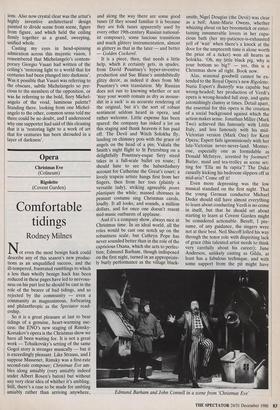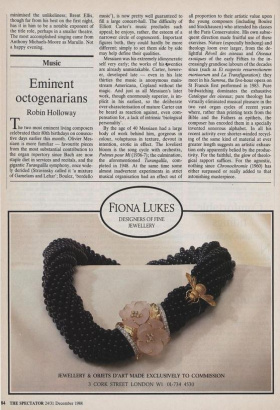Opera Rigaletto (Covent Garden)
Comfortable tidings
Rodney MiInes
Not even the most benign hack could describe any of this season's new produc- tions as an unqualified success, and the ill-tempered, frustrated rumblings to which a less than wholly benign hack has been reduced in these pages have led to nervous- ness on his part lest he should be cast in the role of the bearer of bad tidings, and so rejected by the community — even a community as magnanimous, forbearing and philanthropic as the Spectator read- ership. So it is a great pleasure at last to bear tidings of a genuine, heart-warming suc- cess: the ENO's new staging of Rimsky- Korsakov's opera is the Christmas show we have all been waiting for. It is not a great work — Tchaikovsky's setting of the same Gogol story is stronger musically — but it is exceedingly pleasant. Like Strauss, and I suppose Massenet, Rimsky was a first-rate second-rate composer; Christmas Eve am- bles along amiably (very amiably indeed under Albert Rosen's baton) but without any very clear idea of whither it's ambling. Still, there's a ease to be made for ambling amiably rather than arriving anywhere, and along the way there are some good tunes (if they sound familiar it is because they are folk tunes apparently used by every other 19th-century Russian national- ist composer), some luscious transitions and much glittery instrumentation, almost as glittery as that in the later — and better — Golden Cockerel.
It is a piece, then, that needs a little help, which it certainly gets, in spades, from David Pountney's hyper-inventive production and Sue Blane's uninhibitedly glitzy decor, as indeed it does from Mr Pountney's own translation. My Russian does not run to knowing whether or not 'may your womb remain as dry as mouse- shit in a sack' is an accurate rendering of the original, but it's the sort of robust sentiment seldom heard in opera, and rather welcome. Little expense has been spared: the company has risked a lot on this staging and thank heavens it has paid off. The Devil and Witch Solokha fly, landing on chimney pots with the grace of angels on the head of a pin; Vakula the Smith's night flight to St Petersburg on a delightfully Pountney-esque fiery steed takes in a full-scale ballet en route; I should hate to see the haberdashery account for Catherine the Great's court; a lovely trapeze artiste hangs first from her fingers, then from her toes (plainly a versatile lady), striking agreeable poses plastiques the while; massed choruses in peasant costume sing Christmas carols, loudly. It all looks, and sounds, a million dollars, and for once one doesn't resent mid-music outbursts of applause.
And it's a company show, always nice at Christmas time. In an ideal world, all the roles would be cast one notch up on the robustness scale, but Cathryn Pope has never sounded better than in the role of the capricious Oxana, which she acts to perfec- tion; Edmund Barham, though indisposed on the first night, turned in an appropriate- ly burly performance as the village black- smith; Nigel Douglas (the Devil) was clear as a bell; Anne-Marie Owens, whether whizzing about on her broomstick or enter- taining innumerable lovers in her capa- cious bath (her my-patience-is-exhausted yell of 'wait' when there's a knock at the door for the umpteenth time is alone worth the price of a ticket) won all hearts as Solokha. 'Oh, my little black pig, why is your bottom so big?' — yes, this is a Christmas show all right. Book now.
Alas, seasonal goodwill cannot be ex- tended to the Royal Opera's new Rigoletto. Nuria Espert's Butterfly was capable but wrong-headed; her production of Verdi's opera is wrong-headed full stop, and quite astonishingly clumsy at times. Detail apart, the essential for this opera is the creation of a social background against which the action makes sense. Jonathan Miller (Mark Two) achieved this famously with Little Italy, and less famously with his mid- Victorian version (Mark One) for Kent Opera; Espert fails ignominiously with her late-Victorian never-never-land. Monter- one, especially one as formidable as Donald McIntyre, arrested by footmen? Butler, maid and tea-trolley as scene set- ting for `Ella mi fu rapita'? The Duke casually kicking his bedroom slippers off in mid-aria? Come off it!
Even more depressing was the low musical standard on the first night. That the young German conductor Michael Deder should still have almost everything to learn about conducting Verdi is no crime in itself, but that he should set about starting to learn at Covent Garden might be considered actionable. Bereft, I pre- sume, of any guidance, the singers were not at their best. Neil Shicoff lolled his way through the tenor role with dispiriting lack of grace (this talented artist needs to think very carefully about his career); June Anderson, unlikely casting as Gilda, at least has a fabulous technique, and with some support from the pit might have Edmund Barham and John Connell in a scene from 'Christmas Eve' minimised the unlikeliness; Brent Ellis, though far from his best on the first night, has it in him to be a notable exponent of the title role, perhaps in a smaller theatre. The most accomplished singing came from Anthony Michaels-Moore as Marullo. Not a happy evening.











































































































 Previous page
Previous page